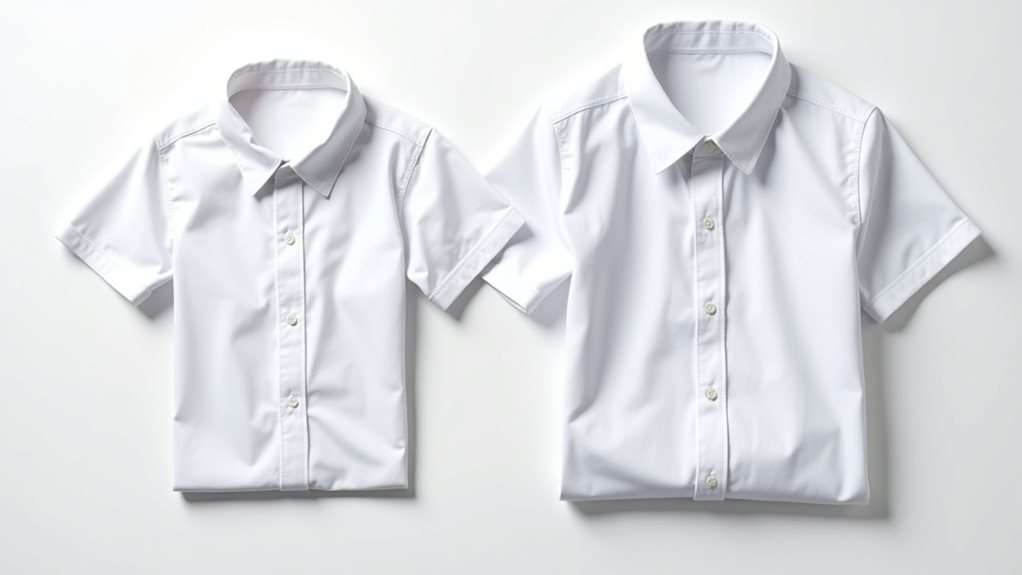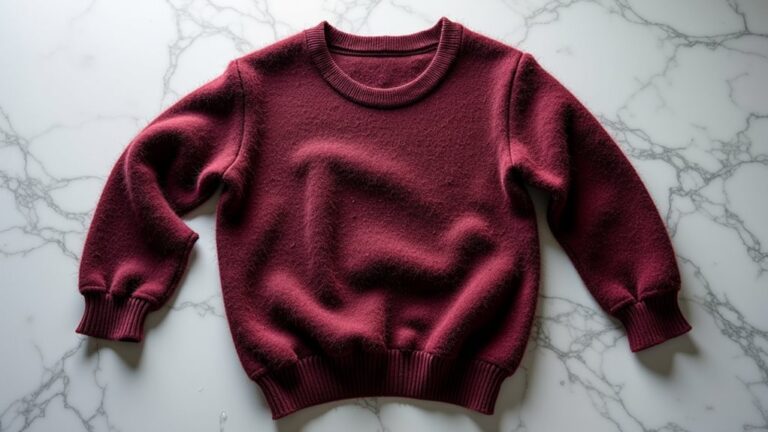While dry cleaning is generally safer than traditional washing, it can still shrink your clothes if the process isn’t handled correctly. Heat exposure during drying, equipment malfunctions, or improper solvent temperatures can cause natural fibers like cotton, wool, and linen to contract, just like I learned the hard way with my favorite cashmere sweater last winter. The good news is that reputable dry cleaners use water-free solvents and controlled temperatures to minimize this risk, though understanding which fabrics are most vulnerable and how to communicate with your cleaner can save you from those heartbreaking wardrobe disasters.
Understanding the Science Behind Fabric Shrinkage
When I first started caring for my own clothes after college, I honestly thought fabric shrinkage was some mysterious laundry curse that randomly struck my favorite sweaters.
I used to think shrinkage was just bad laundry luck hitting my best clothes at random.
But understanding the actual science behind it completely changed how I approach garment care.
Here’s what actually happens: natural fibers like cotton and wool contain built-in tension from manufacturing, and when you expose them to heat causes and agitation during washing, those fibers literally contract and tighten up.
That’s why checking your care label matters so much – delicate fabrics need gentler treatment.
Dry cleaning services use solvents instead of water, which greatly reduces shrinkage risk since there’s minimal heat and agitation involved.
The chemical solvents used in professional dry cleaning are particularly effective at maintaining the original size and shape of delicate items like wool and silk.
Following proper washing instructions and choosing the right dry cleaning machine can prevent shrinkage disasters!
How the Dry Cleaning Process Actually Works
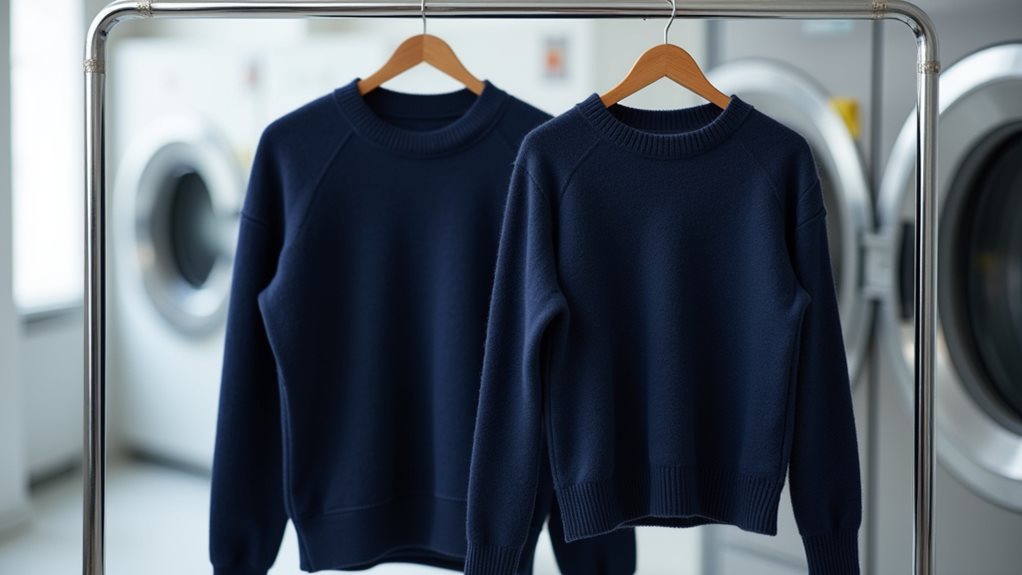
Three key steps transform your wrinkled, stained garments into fresh clothes through the dry cleaning process, and honestly, watching it happen for the first time made me appreciate why professional cleaners can work miracles on pieces I’d given up on.
First, your clothes get inspected for stubborn stains and damage before entering the machine.
Next comes the actual cleaning cycle, where water-free solvent (usually perchloroethylene) breaks down dirt and oils without the moisture that typically causes shrinkage.
Finally, the garments are dried and pressed. This gentle approach minimizes fabric distortion since there’s no agitation from water, though I’ve learned that proper maintenance is essential—machine malfunctions or high temperatures can still cause problems if equipment isn’t regularly checked.
Modern dry cleaners may also use eco-friendly solvents like hydrocarbon or liquid CO2 as alternatives to traditional perchloroethylene for environmental and safety reasons.
Which Fabrics Are Most Vulnerable to Shrinkage
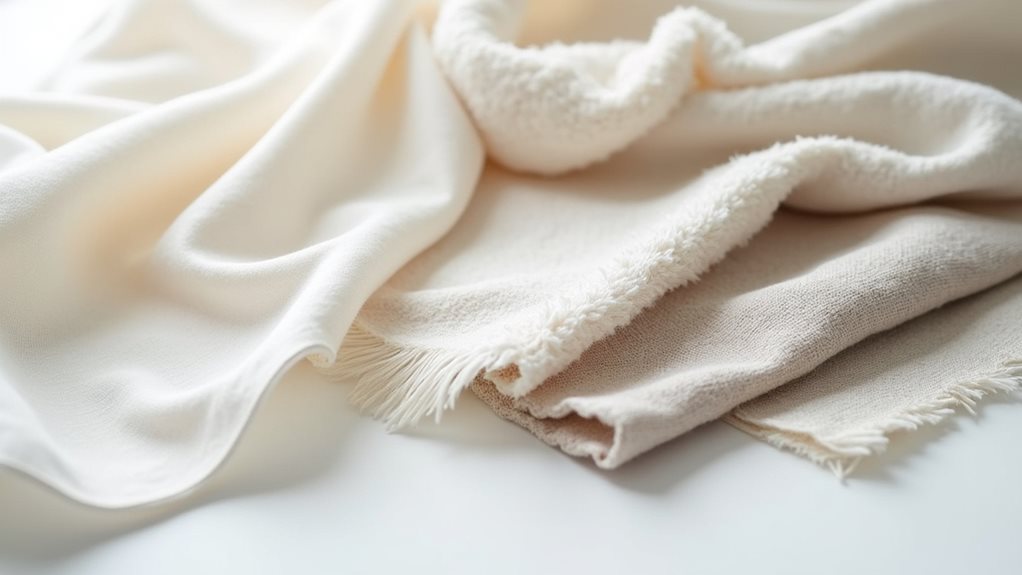
Natural fibers act like sponges when it comes to absorbing moisture and heat, which explains why I’ve watched countless cotton shirts emerge from poorly managed cleaning cycles looking like they’d fit a toddler instead of an adult.
Cotton’s the biggest culprit, potentially shrinking up to 20% if it hasn’t been pre-washed, while wool becomes a felted disaster when exposed to high heat during the drying process.
Don’t get me started on linen – those beautiful summer pieces can tighten faster than your jeans after Thanksgiving dinner! 😅
Even delicate fabrics like silk lose their elegant drape when mishandled.
Dry cleaning uses chemical solvents instead of water to safely preserve these fabrics’ integrity and prevent the shrinkage disasters that occur with traditional washing methods.
That’s why following care instructions isn’t just a suggestion, it’s your fabric’s lifeline against shrinkage catastrophes.
Preventing Shrinkage Through Proper Care Techniques
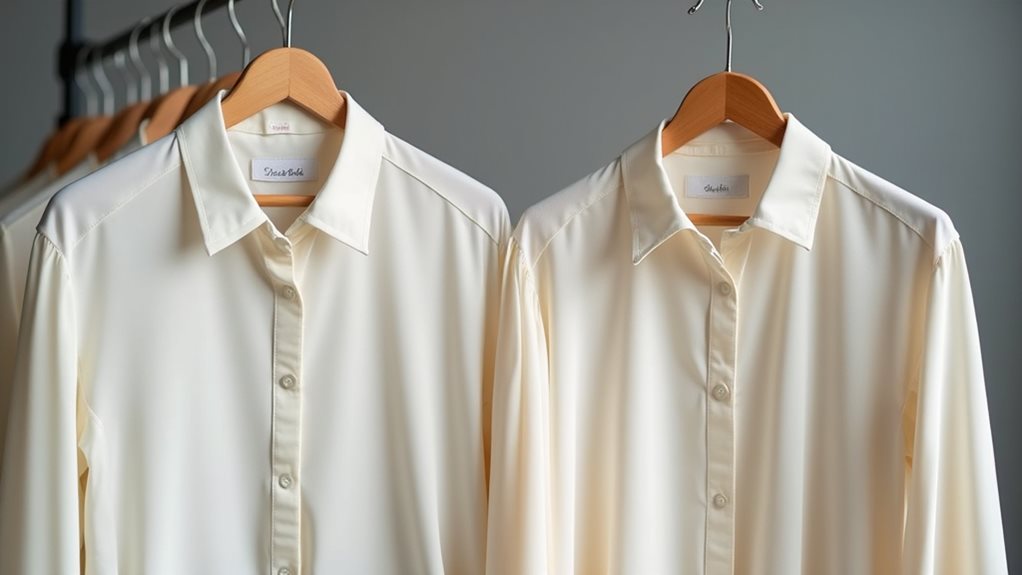
Since I’ve learned the hard way that prevention beats panic-shopping for replacement clothes, I can tell you that mastering proper care techniques is your best defense against the heartbreak of shrunken garments.
Here’s my crucial care playbook for keeping your fabrics intact:
- Read those care labels religiously – they’re your roadmap to prevent shrinkage disasters.
- Communicate openly with your dry cleaner about delicate garments and specific concerns.
- Choose minimal heat settings when drying, or better yet, air dry whenever possible.
Finding a reputable dry cleaner who understands fabric vulnerabilities has saved my wardrobe countless times.
I’ve discovered that being upfront about my worries – whether it’s a vintage blazer or expensive wool sweater – helps them adjust their process accordingly.
Be especially cautious with synthetic blends and natural fibers that may not have been properly pre-shrunk during manufacturing.
Choosing the Right Professional Cleaning Service
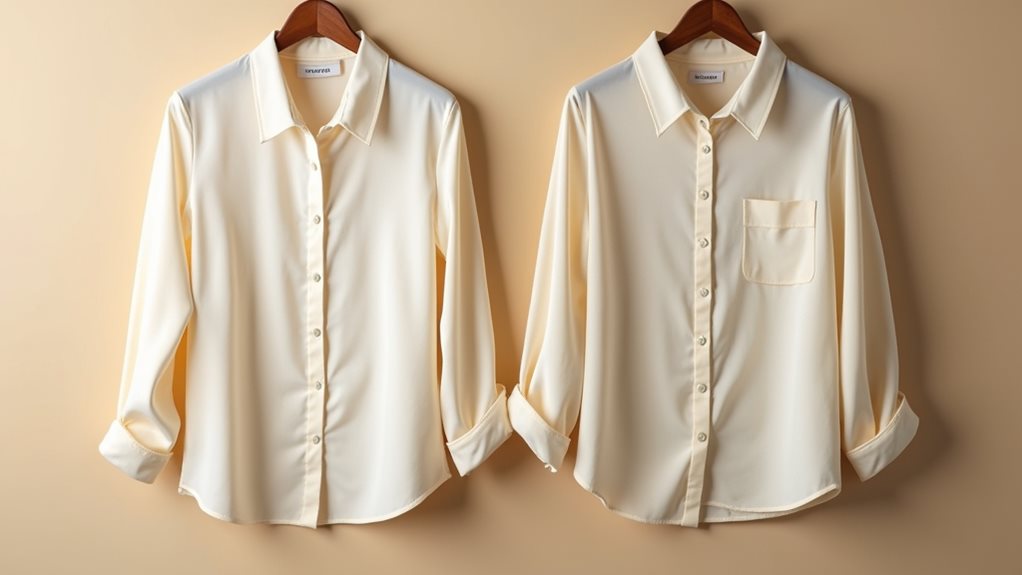
How do you separate the fabric-savvy professionals from the ones who might accidentally turn your favorite cashmere into doll clothes?
Start by hunting down dry cleaners who’ve mastered delicate fabrics—these experienced pros understand that your silk blouse isn’t just another garment, it’s practically family.
Seek out professional cleaning services that champion eco-friendly practices, since their gentler solvents naturally minimize shrinkage compared to harsh traditional chemicals.
Look for cleaners offering alternative methods like wet cleaning, CO2 cleaning, or biodegradable solvents, as these eco-friendly options are generally safer for both your garments and the environment.
Customer reviews become your secret weapon here; scroll through testimonials specifically mentioning garment care victories.
The best cleaning services always perform thorough pre-inspection, catching potential trouble spots before disaster strikes.
Don’t be shy about discussing your shrinkage concerns upfront—quality cleaners will adjust their cleaning techniques accordingly, treating your wardrobe with the respect it deserves.

